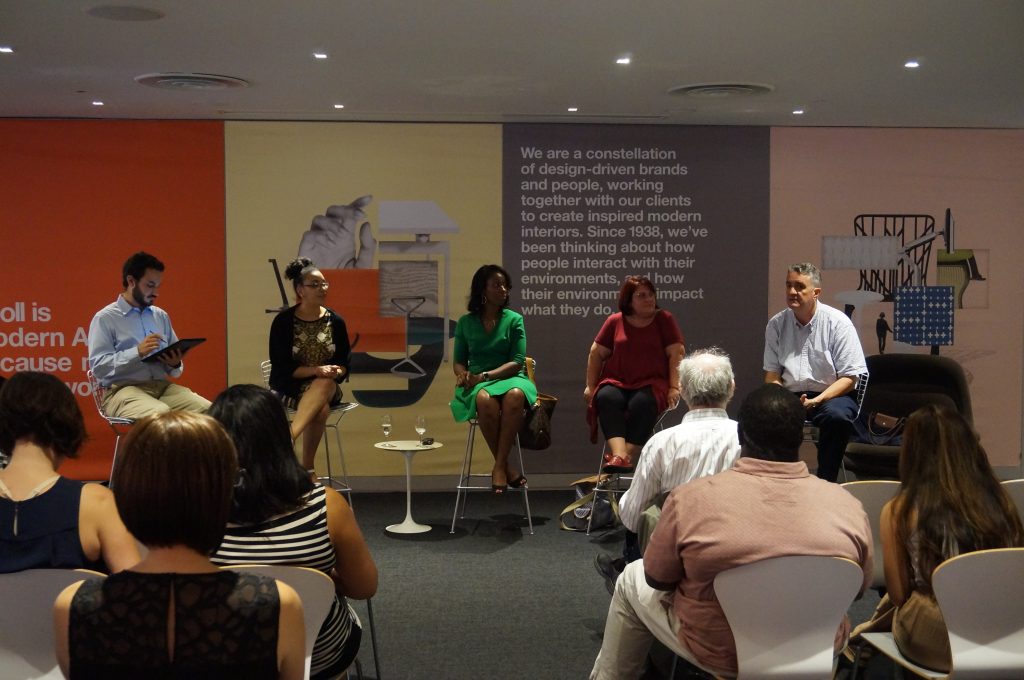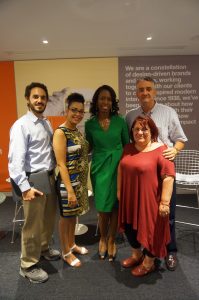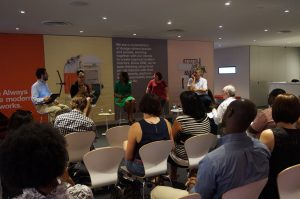{Green Careers} July 2016 Recap: Interview Skills- Discussion/Workshop
July 29, 2016
By Thomas Storck On July 12, a diverse group of experts joined GreenHomeNYC Careerists to offer advice to job seekers in both the private and public sectors. While the focus was on the job interview, the speakers also addressed pre- and post-interview strategies to help applicants strengthen their prospects at all stages of the job application process.The speakers who offered their insights were:
Yianice Hernandez, Director of Active Living at NYC Department of Health & Mental Hygiene Aquila Leon-Soon, Chief Executive Officer & Social Entrepreneur at Advance Talent Solutions Liliya Shames, Deputy Director of Optimization at NYC Department of Education Andy Padian, Founder and President of PadianNYC Consulting Matt Gerson, GreenHomeNYC Volunteer Start by Managing Your Internet Image Your interviewer is judging you well before you’ve had the chance to meet, so before beginning your application, take stock of your activity on social media. If they consider hiring you, a potential employer will likely research you online, which can both help or hurt you during the application process. Remove anything from your personal sites that you wouldn’t want an employer to see (or update your privacy settings accordingly). Make sure your resume matches your LinkedIn profile. Also, if your LinkedIn page shows that you are connected to people in the industry, liking articles and writing about relevant issues, it shows that you are doing your due diligence online as a professional. Once you actually get a correspondence going with the interviewer or the organization you’re applying to, be very professional in all your emails. Getting the Interview After you’ve written a short cover letter (aim for about 3 paragraphs) that speaks specifically to the position for which you’re applying, send it along with your resume as a single PDF with your name included in the file name. If you include references, be clear about how you know them and include both their phone and email contact information. Avoid following up about your application while waiting for an invite. You don’t want to be a pest. If you’re applying for a job with the City, be aware that the hiring process is typically slow. In some cases, an agency may have already decided who they want to hire but are still legally obligated to submit a job posting. If you feel you must follow up about your application, contact someone in Human Resources. If you prefer, and unless the application instructions say otherwise, feel free to visit the office to submit your resume in person. You’ve Been Invited! Once you’ve set a date for the interview, do your best not to reschedule. If you have to be out of town, suggest doing a Skype interview (see other article for Skype tips). But if you’re applying for a position far away from where you live, be prepared to get on a plane for your interview. Know your resume backwards and forwards. Whatever you may have exaggerated about your skills – make sure you can defend them. If your resume shows large gaps in between jobs, be prepared to explain them to your interviewer. Research the company, organization or agency religiously. Read everything on their website, familiarize yourself with as many employees as you can, and make sure you know what they do! It’s important to have questions for your interviewer once you meet, so you can always use that opportunity to clarify information you didn’t understand or couldn’t find while doing your research. If the job posting gives a vague description of the position, it’s okay to be unsure if you’re qualified. During the interview, feel free to ask for more information, or if there’s any additional experience you might need. The Interview Bring copies of your resume. Your interviewer may not have seen it yet. Consider bringing both a two-page version and a one-page summary. If you can, it also helps to bring writing samples, especially if they’ve been published. You can send papers electronically after the interview too, but be sure to send them when you say you will. Arrive to the area 20-30 minutes before your appointment. Remember that trains don’t always run on time. As for dress code, even if you know the company is laid back, err on the side of professionalism (suit and tie, business dress, etc.). Even if the workplace is casual, the position may involve dressing formally for client meetings. Brush your teeth, comb your hair and take a shower. Be confident! If you walk in thinking you’re unqualified, no one will be convinced otherwise. And remember to treat everybody you interact with at the company with respect regardless of their position. Greet your interviewer(s) with a firm handshake and make eye contact. Thank them for the invitation and show that you appreciate their taking their time to meet you. Saying something positive at the start will help set a good tone for the rest of the interview. Meeting with a group of interviewers can feel intimidating, but group interviews are common in City jobs, so be prepared for this possibility. Greet everybody and do whatever is necessary to remember their names. Know how to address them, according to their position (e.g. Your Honor, Deputy Commissioner, Senator). If they prefer not to be addressed so formally, they will say so. Don’t be too chummy. You don’t know their sense of humor. Watch your language – even if your interviewer is cursing, avoid joining in. They will judge you on EVERYTHING, so act professionally in every way. While it’s important to know if the company’s culture is right for you, consider waiting until the second interview to ask about that, if you can. Otherwise you could come across as picky or arrogant. If this is your first job, you may not yet have the skills or experience to afford being too selective about a company’s culture. Do pay attention to the office environment when you walk in; there’s a lot of information in what you observe. Envision yourself having already been hired. Consider some problems the organization might currently be having and come into the interview with examples of what you might do if you were in that role. Being calm, personable and well prepared with new ideas will allow for a robust conversation. It’s Over! (Almost) Handwritten thank you notes are not expected, but they are a nice touch and can help you stand out. If nothing else, definitely send one by email – the sooner the better. Personalize each email – one to each person in the interview. And don’t forget to attach those articles or papers you didn’t bring with you to the interview. After the interview, avoid following up on the status of your application if you don’t need to. You can send a follow-up email if you want to supply additional information, but don’t be annoying. Especially if it’s a position with the City, be patient; the hiring process is typically slow. But now that you’ve got the process down pat, there’s no need to just sit around and wait. Maybe there’s another job out there you might want to apply for…Photo credit: Emily Taubenblatt




